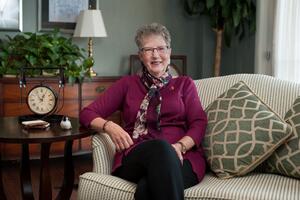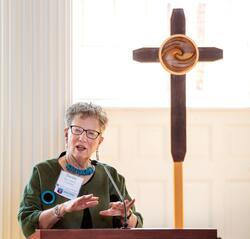A Ministry of Absence
 By Davida Foy Crabtree (MDiv ‘72)
By Davida Foy Crabtree (MDiv ‘72)In this time of pandemic as I monitor social media posts from clergy, my thoughts have hearkened back to a book I have always wanted to write on a theology of absence. Christian ministry has been focused for a couple of decades now on ministries of presence. I share a high value on presence in its many forms, yet I also believe that there are times when a ministry of absence can be yet more faithful.
As we endure our isolation from one another and recoil from human touch, what would happen if we allowed ourselves to imagine positively a ministry of absence? After all, Jesus left the disciples at a number of points to go off by himself, and not coincidentally to test their faith, faithfulness to his teaching, and capacity to become the beloved community. Most great leaders seem to have done the same.
Perhaps this is a time when instead of fretting about how we cannot be present to those whom we believe need us, we might focus on the efficacy of our absence and the way in which it offers an opportunity to build stronger discipleship and shared ministries. 

Decades ago I was a very active member of the United Church of Christ’s early work in the women’s movement. I also served on the national executive council for the denomination. So my sisters always turned to me for advice on how to effect the change we envisioned in our UCC life. I shared that advice liberally – until it dawned on me that despite all my efforts to teach them what I knew, as long as I was there, they would turn to me instead of building their own political analysis and strategies. So I resigned. And told them why. Fortunately they heard my worry and took it to heart and built a much more shared way of work than would have been possible with me there to lean on.
A few decades later I had the opportunity of a sabbatical from the parish I was serving where my focus was on the ministry of the laity in their daily lives and workplaces. Our work was becoming known (and eventuated in Alban Institute publishing my book The Empowering Church in 1989), and I was in much demand as a speaker. During my “absence” on sabbatical, I realized that once again in order to move that ministry ahead, I needed to challenge the lay leaders of the church to take on those speaking engagements instead of me. They did, and their spiritual and personal growth expanded exponentially.
Now we are in a new day of ministry, one with forced absences. Pastors cannot meet one on one with hurting and grieving parishioners. Congregations cannot gather. The informal, casual connections that nurture community are gone. I have been impressed with the creativity and fortitude so many ministers have brought to the moment. We have left behind all imagining that our congregations would never accept streaming, or screens in worship, or meetings via technology for important decisions. Yet I also see pastors attempting to meet every need, to be present to every situation, to have a word prepared for each occasion.
I keep thinking to myself “What if we used our absence for the good of the Church?” What if we were able to set aside this notion that the only good ministry is a ministry of presence? What if we used this opportunity to build networks of people with shared interests and encouraged them to minister to one another? Perhaps the role of pastor has a potential in this moment to be transformed into the spiritual guide and teacher more than the one who is present to everyone. Perhaps the focus in the near future needs to be on discovering the gifts, needs and skills, the passions and vocations of the people in new and deeper ways. Perhaps the entire quality of life of a congregation can be built up by the pastor’s needful absence instead of steady presence.
Needless to say, I am not advocating that pastors absent themselves from ministry, just that we open ourselves radically to the new thing that God may be doing in this moment: giving us to each other in a new way just when we think we are driven apart.
For an explanation of this weekly series, see the announcement on our news feed.
To learn more about our trustees, visit the Trustee page on this site, where you will also find a full bio for Davida Foy Crabtree.
